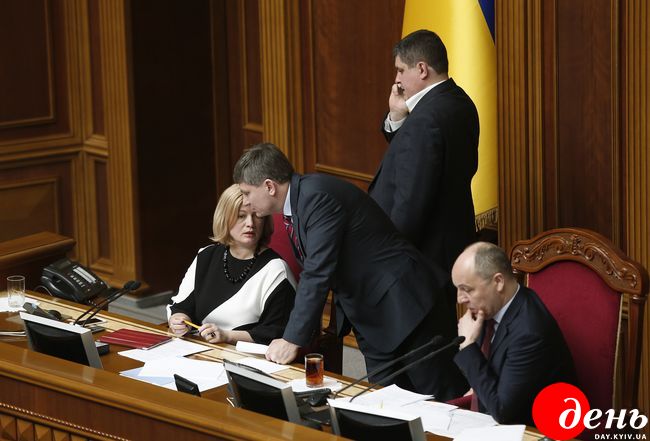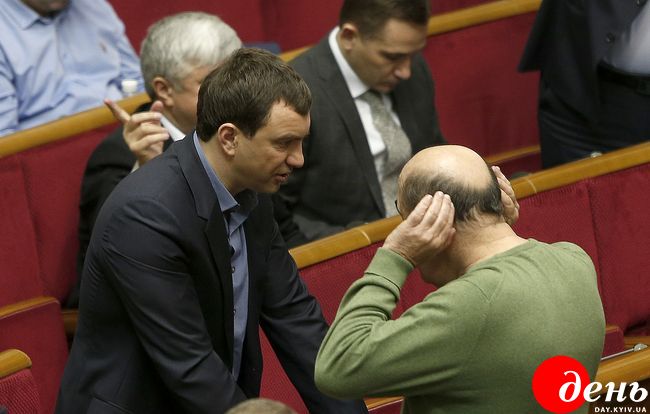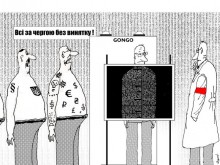The acronym GONGO (Government-Organized Non-Governmental Organization) means nominally nongovernmental associations which have been established on the initiative or with participation of those who wield power – both formal (the president, the Cabinet, MPs) and informal (oligarchs, multinational corporations, foreign business, and politicians) – and work in the interests of the “creator.”
In October 2009, Moises Naim, a Libyan-born American researcher, the author of the international bestseller The End of Power, wrote an article, “What is a GONGO?” in which he describes a dangerous alliance between the civic sector and politics, the authorities, and business. He calls it extremely dangerous to the state and the populace because it tarnishes the reputation of the civic sector, one of the strongholds of a rule-of-law state and a harmonious society. Naim examines the role of these organizations in public administration. GONGOs allow managing political processes by creating an illusion of democracy. There are many examples of such organizations. The same applies to Ukraine. But our conditions have brought forth a no less interesting subdivision of GONGOs which began as NGOs, but things went awry.
Verkhovna Rada Speaker Andrii Parubii said at a conciliation commission session that parliament has two new bills on canceling e-declaration for public activists, which may be discussed as soon as Tuesday, April 3. But they failed to so. On Monday, the parliamentary Committee for Corruption and Organized Crime Control did not manage to gather a quorum because Petro Poroshenko Bloc members failed to show up.

ANDRII PARUBII UNSUCCESSFULLY PUT THE PRESIDENTIAL BILL ON CANCELING E-DECLARATIONS TO A VOTE FIVE TIMES / Photo by Ruslan KANIUKA, The Day
The Day has written a lot about e-declaration for public activists. At first we just reported the following fact: Tetiana Chornovil, an ex-investigative journalist of Ukrainska Pravda (!), a corruption fighter (!), an active participant in the Second Maidan (!), and now a People’s Front MP, mooted a well-known “discriminatory amendment.” An Anticorruption Center lawyer commented, explaining what this meant for the Ukrainians who work in the civic sector on a legal basis. Then we analyzed causes and results more in detail together with a founder of the “Declarations under Control” coalition (“They Hooked All Public Activists,” Den of June 9, 2017). Quoting participants, experts, and the main players, we wrote about the president’s compromise which public activists heard at a personal meeting with Petro Poroshenko – declarations are to be canceled, with only broad-scale reporting being left behind. We criticized the National Agency for Prevention of Corruption for an absurd explanation of who is to submit declarations as an “anti-corruptionist.” As the author of all these texts, I personally took part in a live Community Radio program, where I was sincerely saying that this provision is absurd. For the logic of e-declaring is to control the people who exert influence on the state budget, laws, licensing, justice, etc. and, hence, are exposed to the temptation of using this for personal enrichment. What is the logic of forcing public activists, who not only do not have all the abovementioned, but also in fact help save the state at their own good will on a volunteer basis, to report on their incomes? I forgot then one “tiny” nuance – we are speaking about Ukraine, in which present-day life has been reduced to such a low level of paradoxes and absurdities that George Orwell would envy us. Add to this the devalued institution of reputation and… “the end justifies the means.” I recalled all this when I saw a “mass grave” of the logos of nongovernmental organization in “New Leaders,” a new ICTV Starlight Media project. Viktor Pinchuk – the media group owner, a well-known Ukrainian oligarch and philanthropist, whose father-in-law once told a US diplomat: “All you should know about Ukrainian politics is that they all, the government and the opposition, are my pupils,” and who wrote a “grandiose column” in The New York Times in the third year of the war with Russia – personally met with some leaders of these organizations. We must give due credit to the businessman: even after drawing so much flak, he successfully continues to do what he has been doing for many years – to bring to and keep in Ukrainian politics and government “his own” people. He also continues to get richer and maintain the status quo of the property he received during the presidency of his father-in-law Leonid Kuchma – this time “under the protection of democratic forces” (a quotation from Pinchuk’s address to Arsenii Yatseniuk at the Yalta Economic Strategy forum after a passage against oligarchs). In a word, Pinchuk’s interest is easy to grasp. He is preparing an alternative president of his own, and he needs a “team.” But what is the interest of our anti-corruptionists in this misalliance?
There are several important aspects in the question of e-declaring for anti-corruptionists. Undoubtedly, it looks like a vengeance. Two years ago, when parliament voted, under the pressure of Western partners, for the law on e-declaring for officials, many of those in the session hall mentally quoted Nikita Khrushchev’s “We’ll show you what’s what.” This desire particularly increased after public activists had organized a public debate on top declarers’ “property striptease” that began on September 1, 2016. And although, by all accounts, the whole story with cash in mattresses, tons of antiques, and hectares of real estate turned into a big “flash in the pan,” the National Agency for Prevention of Corruption checked dozens of top declarers, including the president, the premier, and ministers, for a very long time, only to conclude peremptorily that “no infractions were found.” Meanwhile, e-declarers themselves are so far performing two functions – sources for gossip and tip-offs for criminals. It is not because the law is bad or e-declaring in Ukraine is wrong. It is all right but does not work. But this is an “open door” which those who will come later to work for the state will be able to use properly. This happened in Romania. The anticorruption reform there “slept” on paper for years. It only began to work when Klaus Werner Iohannis, a longtime leader of the Democratic Forum of Germans in Romania, was elected president.

The second aspect is political weakness of the president in the ranks of his own party. Petro Poroshenko gave a public promise which cannot be fulfilled because a part of the PPB parliamentary faction does not want to vote.
The third aspect is recognition of anti-corruptionists and the civic sector as political players in Ukraine. MPs understood at a certain moment that civic organizations, especially the ones that fight corruption, had gained such clout that they can force them to make decisions even against their own will for fear of political rating and the loss of a favorable attitude on the part of the IMF and the European Commission. No wonder, in these conditions the leadership wants to know who orders the policy which public activists advance so successfully and, at the same time, “work up the West so skillfully,” and to what extent generously this customer pays for this.








